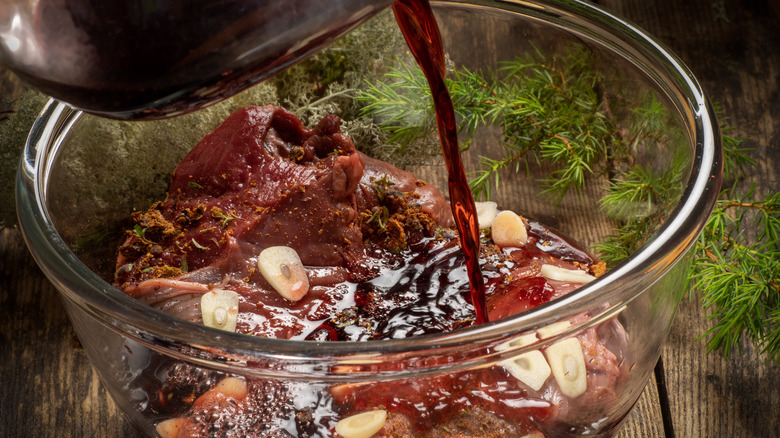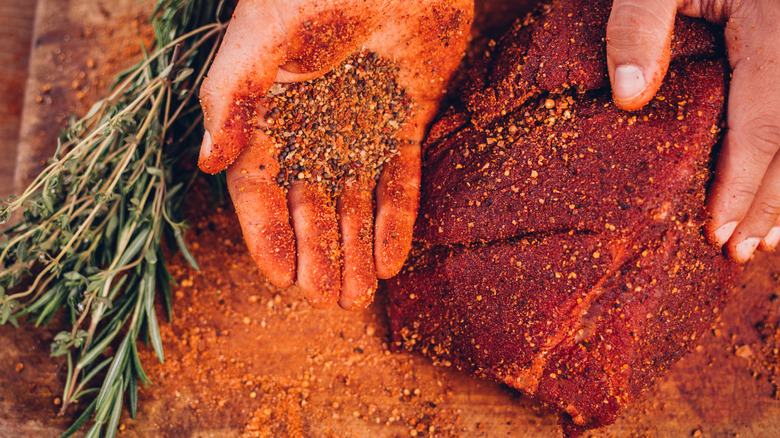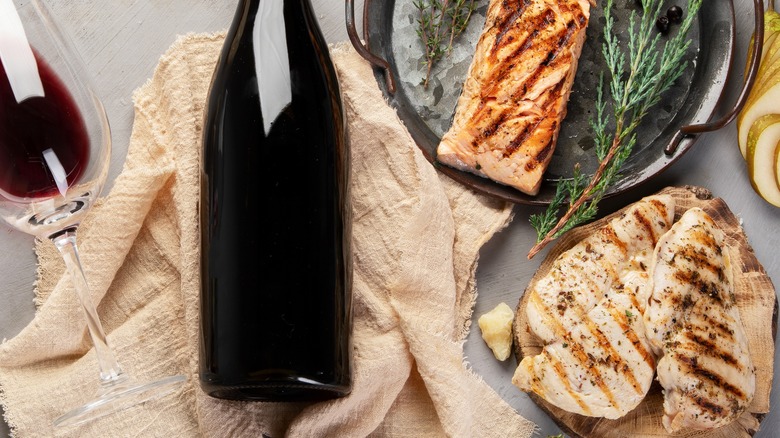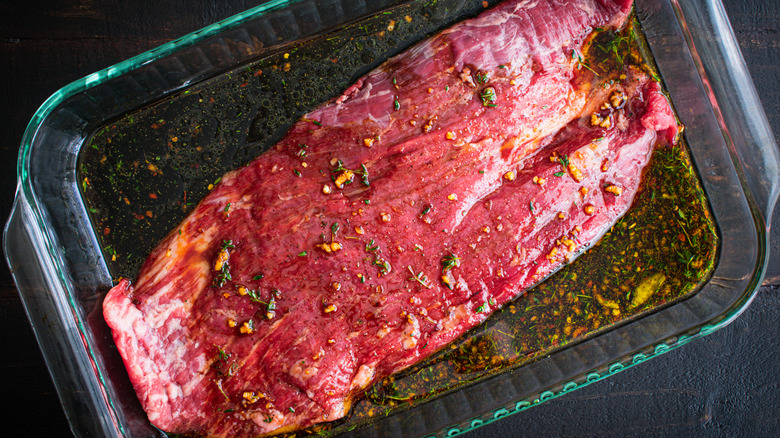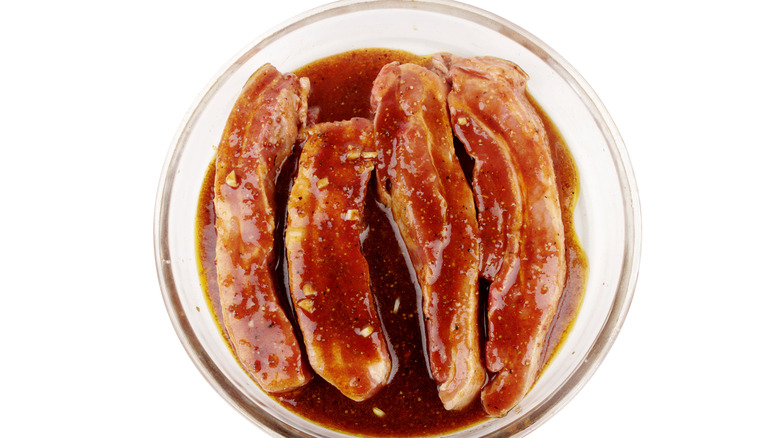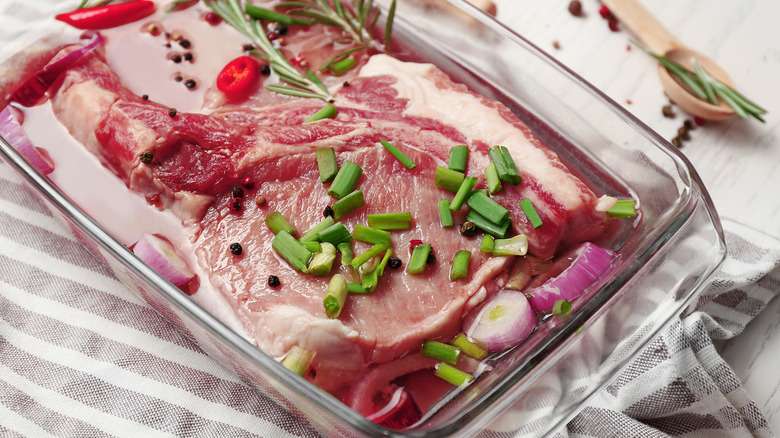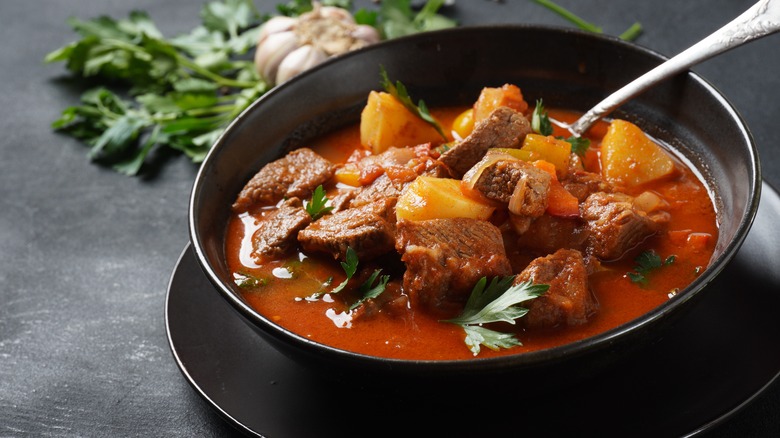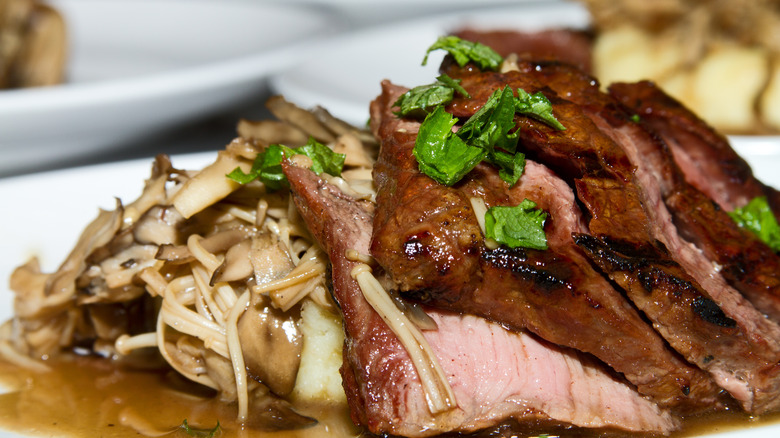The Best Wines To Use In Marinades For Steak, Chicken, And Pork
If wine is a great addition to any meal as a drink, it might be even better as a marinade. Working in a boutique wine shop, I've come across patrons who buy as much for cooking as for drinking. As staff, we guide them to choices that have all of the characteristics that we celebrate various wines for. Selected carefully for sauces or marinades, wine can add extra zing that also helps tenderize pork, chicken, and steak dishes. In addition, a good bottle usually contains aromatic compounds and herbs like rosemary, garlic, and thyme. This helps with enhancing the overall flavor profile of your main course.
Tannins and acidity in the wine also assist with the marination process. They work in tandem, the acid beginning the tenderization process and the bitter tannins contributing depth and complexity. A highly tannic wine like a syrah can be good for a marbled cut of meat, while a low tannin wine like a gamay is perfect for a lean cut. For poultry or more delicate meats, white wines with moderate acidity, like pinot grigio or sauvignon blanc, can work wonders. We'll look further into that in the body of the article. Whether you're using a full bottle or leftover wine, you'll want to marinate your meat in the refrigerator for 30 minutes to a few hours; if you have the time, an overnight marinade will ensure maximum flavor infusion. Here are 13 wine varietals to use in marinades for steak, chicken, and pork
Pinot grigio and chicken
A popular offering most famously made in Northern Italy, pinot grigio has long entranced wine aficionados for its crisp flavor profile, redolent of green apple, lemon, lime, pear, and even peach. Aside from savoring it in a restaurant or on your porch, it's good for use in such plates as pasta carbonara, as part of the sauce in chicken cacciatore, and even in a few fish dishes. Not to be confused with the usually sweeter pinot gris, which is the same varietal grown in places like the Alsace region of France, it's almost dangerously easy to drink and can often have a subtle floral aroma.
Pinot grigio is typically dry, has an understated minerality, and helps to moisten chicken quite beautifully. However you choose to cook your chicken, consider adding some Italian parsley, fresh oregano, lemon, and garlic to the marinade as a complement to the flavors already present in your brand of choice.
Carménère marinade and steak
Carménère is another varietal that originally grew exclusively in France but is now mostly identified with a South American country. In this case, Chile. Interestingly, this came about completely by mistake. Cuttings had been brought over in 1850, but they were mistaken for merlot. Instead of investigating the reason why these grapes tasted differently from traditional merlot they instead renamed it merlot chileno. It was only in 1994 that the mistake was revealed, and carmenère, a historic vine, was re-revealed in all its glory.
Carménère is noted for blackberry and green pepper notes, with a herbaceous aroma. Imagine that on the tip of your tongue as you're chowing down on a leaner cut like skirt steak. You can also add in some smoked paprika for a hint of acridness, cayenne pepper for heat, and even bay leaves if you so choose. With Chilean wines getting more notice amongst aficionados, it's a good choice for both drinking and marinating to impress your guests if you're planning a dinner party.
Riesling and chicken
Speaking of acidic, a typical riesling punches well above when it comes to that characteristic. The acid softens connective tissues, making the meat more tender. While Germany is far and away the country best known for producing the varietal, you can also find fine examples in places like Australia, New Zealand, the U.S., and Canada. Whichever you choose, and whether it's a dry or sweeter riesling, keep in mind that the terroir will have a profound effect on what you taste and smell in the marinade.
Riesling works quite well with citrus flavors, so consider using lemon or lime juice and zest, which will impart some brightness to the marinade and into the neutral canvas that chicken offers. Aromatic ingredients like shallots and minced garlic, as well as fresh herbs such as tarragon, thyme, and rosemary, will add a flavor punch to the final result. Finally, Dijon mustard is something of a stealth condiment weapon that will ramp up the creaminess quotient and help emulsify the ingredients. Another option for your chicken dinner is to check out this recipe involving riesling and apricots.
Dry Sherry marinade and pork.
There are so many cliches surrounding sherry, mostly to do with elderly English women sipping a glass in an Agatha Christie novel. Well, dispense with them right now. Like a few of the other wines we've discussed in this article, the fortified wine from Spain can be dry or sweet, light or dark, and can be used quite nicely with rabbit, pheasant, or as an addition to soup. There's a whole world of sherry out there to be discovered, including using a cup or so in a pork marinade.
The best sherry for a marinade would probably be Amontillado, which boasts a nuttiness and aura of sautéed mushroom that tastes perfect for lean meat like pork. Being aged and fortified, its musk also imparts a dense aroma when you marinate a neutral protein like pork. Commonly, Amontillado has notes of hazelnut and rich tree nuts, so add some dried thyme, rosemary, and ground paprika, along with whatever elements you might choose for a herbaceous quality with a hint of smokiness. Once you've shaken off the excess marinade, it will caramelize on the meat, imparting a delectable glaze and adding an extra depth of flavor.
Pinot noir and chicken
In the 2004 movie, "Sideways," Paul Giamatti's character Miles says this about pinot noir: "Its flavors, they're just the most haunting and brilliant and thrilling and subtle and ancient on the planet." It sounds like a good recommendation to not only have a glass but to soak your chicken in a nice California pinot, doesn't it? Well, that and a natural acidity which — augmented with balsamic vinegar or red wine vinegar — helps to tenderize the chicken and balance the flavors.
A pinot noir marinated chicken is excellent for grilling or roasting; the high heat will caramelize the sugars in the marinade and create a delicious glaze, while the acids will allow it to become more tender. There are many reasons other reasons to marinate white meat, like chicken, with pinot noir. This wine marinade can gently infuse chicken with the earthy, darker profiles that some sauces (like barbecue) give it. Jammy pinot and succulent chicken also evoke the beloved holiday pairing of cranberry sauce and poultry in an umami, tang way that isn't just lemon or lime. If you want to learn where to start with Miles' favorite varietal, we've put together a handy guide to pinot noir.
Lambrusco marinade and pork
It's been in and out of fashion over the years, but Lambrusco wine always somehow sneaks back into the public eye and in the public mouth. This lightly sparkling Italian wine was mostly known as a sweeter drink a half-century ago, but the market is now flooded with a myriad of choices. In cooking terms, this presents us with plenty of possibilities, whether a dry, orange blossom-scented Lambrusco di sorbara or a sweet and tannic salamino. Try it with prosciutto and prepare to be devastated (in a beautiful way) by the pairing, but a Lambrusco marinade will truly elevate meat with a porcine profile.
Lambrusco works as well as any other red wine when it comes to marinades, but it has the special advantage of being slightly carbonated, which contributes to a more acidic pH and, thus, a tenderizing effect. The flavor profile of Lambrusco is often stonefruit and rhubarb. Marjoram and sage are natural herb choices for marinating pork with Lambrusco; as is a small amount of soy sauce, though you'll want to use low sodium. If you've opted for the dry or off-dry Lambrusco, brown sugar and honey will work well as sweeteners. Garlic is never a bad idea, and fresh ginger makes all the difference in the world.
Rosé wine marinade and steak
There's the common assumption that rosé is for drinking on the patio, not for pouring into marinades — especially a steak marinade. Well, throw those assumptions away and think about how a bottle of rosé can add delicate fruit notes to your dish. Keep in mind that the color of the rosé you're using will dictate the flavors it imparts; a light rosé wine is roughly similar to a white, and you might be working with subtle notes of strawberry, melon, or cherry. A darker rosé intensifies the experience; it all depends on the grape used.
There are no hard and fast rules for marinating steak with rosé, however. Which variety you choose will simply give you a different experience. You don't need to go heavy on the extra marination ingredients, especially with a darker rosé made from grenache, cinsault, or syrah, which might give you extra flavors of olives or lime. Instead, aim for primary seasons of salt and pepper and maybe a bit of oregano. Tarragon would be a good herb to add to the medley you make, and along with olive oil, mustard, and garlic, can bring out the brighter, acidic components of a lighter rosé.
Marsala wine and chicken
We're going to dig a little deeper here with Marsala, a fortified Sicilian wine that can make astonishingly rich sauces and marinades. The wine itself comes in three versions: secco, which is the driest version with less than 40 grams of sugar per liter, semi-secco, which ranges between 50 to 100 grams; and dolce is the sweetest with over a hundred grams of sugar per liter. Will this make a difference in your marinade? Not really, though most people will choose dry because of the residual sugar in the dolce.
Suggestions for a Marsala chicken marinade include a small amount of olive oil for flavor distribution, as well as minced or crushed garlic cloves, and a combination of finely chopped fresh herbs like rosemary, parsley, and thyme. Shallots and onions are also a good choice, as well as Dijon mustard. Play around with the ingredients a little to find the right combination, salt and pepper to taste. Best of all, if you reduce a Marsala marinade with your chicken in the saucepan, you'll create a lovely sauce as well, possibly for risotto.
Madeira marinade and pork
Still moving along on the fortified wine tip, Madeira also acts as a good base to create an excellent marinade for your pork dish. Named after the Portuguese islands that it originated from, Madeira came about through the most practical of reasons: on seafaring trips, wine would spoil, so a little brandy was added to "fortify" it. It came into use as a good cooking wine as well with the addition of salt and pepper, but any bottle you buy will make a dish sing. Madeira wine has higher amounts of sugar which won't tenderize your meat but will allow for a layered profile that balances heavier, salty additions, including soy sauce.
Pork meat will take nicely to the deep, sweet, and subtly nutty flavor of a good Madeira. The mouthfeel of Madeira is certainly thicker as well, which can add body and glaze to your marinade. Pork chops, tenderloin, or ribs will all benefit from this; just make sure to occasionally massage the pork in the marinade for even distribution. Tarragon, sage, and allspice are some of the obvious ingredients to leverage, and you can also get inventive as well by throwing in caraway seeds and fennel. Just taste as you go along and find the balance you're looking for. Aside from being great in a marinade, Madeira is also a perfect after-dinner drink.
Petite Sirah marinade and pork
Lodi, a region in Northern California, has suffered an image crisis ever since Creedence Clearwater Revival made it the title of the song about a struggling musician. It may not be where you want to be as a young band looking to make it big, but it is the location to look for if you want to pick up a bottle of delicious petite sirah. The varietal is a crossover between syrah and peloursin that made its way from France to the U.S. in the late 19th century. Highly tannic and full-bodied, petite syrah isn't something you'd want to drink with your lean pork tenderloin. But as a marinade? Oh yes!
You can expect a robust and fruity flavor in your pork dishes with a petite sirah. Not only will it complement the pork beautifully, but the wine will bring a rich and peppery complexity to the final result, with trace flavors of chocolate, plum, and blueberry in the mix. Tannins will play a crucial role in the marination process, acting as a natural tenderizer by loosening muscle fibers and helping with the breakdown of collagen. The result? Your pork will not only have a softer texture, but the marinade will penetrate deeper, working with your herbs to create a harmonious blend.
Malbec marinade and steak
We're getting into the heavy hitters now, not just taste-wise but in terms of popularity. Malbec is an almost automatic choice wine pairing for steak, especially leaner cuts of steak, which can have more distinct minerality — despite the lack of fat — and so won't be overwhelmed by the richness of the wine. (Malbec is most certainly a rich wine.) This, of course, makes it a good choice for marinating whatever dish you might be concocting. A grape from France that's now grown worldwide, recent years have seen a boom in production, with Argentina in particular becoming a go-to for malbec. Check out your local liquor store or boutique wine shop; there are some very affordable and stunning wines on offer, all with their tasting profiles.
Malbec is known for its fruity and spicy character, so you'll have a fine base with which to work on your beef. Leaner cuts that need longer and acidic marinations, like skirt steak or flank, would be good choices for marinating with. malbec. Flat iron steak and tri-tip, both of which already have a good balance of flavor and marbling, can also be a pairing.
Chianti marinade with beef stew
Yes, we know that it's the go-to drink for pizza or pasta with bolognese sauce, but a sangiovese-based Chianti marinade is also great for any beef stew recipes you might have. It's also one of the 15 types you should try if you want to explore Italy through wines. We'll skip the Hannibal Lector jokes and instead note that there are eight sub-zones of Chianti, and each will have certain characteristics that you might enjoy using in a beef marinade. You can find Chianti which ranges from medium to full-bodied, with flavors like redcurrant, balsamic vinegar, plum, and blackberries. All are excellent when infused into the beef cubes of your stew.
For the classic Italian touch, you'll want to go with rosemary, thyme, oregano, and basil as herbs for your marinade. These will add depth, botanical and aromatic notes to the final result. If you want to add a hint of terraceousness, you can also incorporate a touch of dried or fresh sage. As always, play around with proportions to find a balance.
Saké marinade with steak
As with rosé, saké is probably a wine that you've never considered using as a marinade. Made from fermented rice through a specific brewing process, saké fulfills all of the same functions that a grape-based wine does when it comes to marinating. Using saké when cooking helps to tenderize the meat, and it can help enhance the flavors of whatever else you add to the marinade. Saké has different characteristics depending on the type; junmai, ginjo, daiginjo, honjozo, and futsu are the five main varieties, and their differences highlight what they can bring to a dish.
For a saké marinade, you'll want to consider the balance as the rice wine has some specific profiles. Start with a base of whichever kind you have on hand, and add soy sauce or a bit of mirin for sweetness. Minced garlic, grated ginger, and a touch of sesame oil will give the dish some depth. Sprinkle in a few green onions and possibly a pinch of red pepper flakes for a hint of heat.
